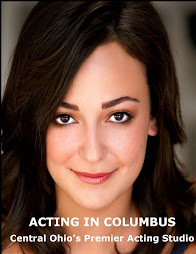 THEATRE AUDITIONS
THEATRE AUDITIONSCONTEMPORARY AMERICAN THEATRE COMPANY (CATCO) AUDITION
CATCO will be holding auditions for the role of A Girl of Twelve in Blackbird by David Harrower. Blackbird won the Olivier Award ( England ’s Tony) for Best Play in 2007. It will be directed by Geoffrey Nelson and features Anna Paniccia and Jonathan Putnam .
Date: Wednesday April 1, 2009
Time: 7:00PM
Location: Studio One Theatre in the Riffe Center at the corner of State and High in downtown Columbus
The play contains adult themes and language, although The Girl’s character is not involved in those moments. The actress will be playing a twelve year old.
Rehearsals begin on Tuesday May 5, 2009. Hard copies of the script are available for perusal. The audition scene can be emailed to you. The role pays $75 per week.
Please contact Jonathan Putnam : jputnam@catco.org [614] 461-1382 x 151
FILM CASTING CALL:
The Melton Center for Jewish Studies at OSU is seeking extras for a shoot on April 1- 2. The project is an educational narrative being produced and directed by Phil Garrett: http://www.imdb.com/name/nm0308186/. Specifically, they're looking for men of a variety of ages (anywhere from late teens on up) to play generic students and townspeople in an Eastern-European town in the 1700s. Unfortunately, this means only people of generally Caucasian ethnicity for this shoot. Hours would be somewhere between 3pm and 12 midnight (more specific hours would be provided soon) and extras would be welcome to work either Wednesday April 1, Thursday April 2, or both.
Please e-mail me with a photo attached (any current photograph will do) if you are interested in working on this projects along with the day(s) you are available: actingincolumbus@yahoo.com
BREAKDOWN: Wednesday April 1 and or Thursday April 2nd: 2-4 Young Men (late teens through early 20s) 6-8 Older Men (mid30s and older)
Auditions for "Downs" a web series to be shot in Columbus, Ohio in 2009
Director: James Aaron Tecumseh Sinclair
Date: Saturday, April 11, 2009
Time: 11:30am - 2:45pm
Location: Grandview Heights Public Library
Street: 1685 West First Avenue
City/Town: Columbus , OH
Phone: 614-878-9938
Email: http://us.mc528.mail.yahoo.com/mc/compose?to=jatsinclair@gmail.com
Auditions are currently slated for April 11, 2009, from 11:30am to 2:45pm. More audition dates may follow based on attendance and performances. If call-backs are required, they will take place on location. Pay is minimal and negotiable. If you have resume and headshots, please bring two copies. Auditions will be cold readings, but also please prepare a 30 second monologue.
Synopsis: "Downs" tells the exploits of Susan Downs, a young occult adventurer, in her search for knowledge. The series is light horror/magical realism, aimed at "one step beyond" the normal experience. The series is supported by a comic book series, which is already on Issue 2. Each short is planned at 10-15 minutes in length. The first is under way; with as many as three planned.
Characters:
Susan Downs: Our protagonist. She traded her eyes for a little bit of occult knowledge. Her ultimate goal is to achieve enlightenment, although her curiosity usually keeps her involved in the world. She is familiar with a number of magical or occult practices, and will usually intervene to stop the forces of evil. She is active with kung fu and esoteric practices similar to yoga or tai chi. Because of Susan's missing eyes, the actress who plays her will be asked to wear full-eye contact lenses. This is also a reoccurring role.
Glenn: A friend of Susan's from college, who has lived with his girlfriend (LISA) for about 10 years. Glenn and Lisa are expecting a baby, which Glenn is not entirely comfortable with. Glenn is attempting to decode a recording made by a French inventor in 1860, a task which consumes him. This task has called up the ghost of the inventor (SPECTER), who is causing more strife in their relationship.Lisa: Glenn's longtime girlfriend, although they have never married. Currently very pregnant, and not crazy about Glenn's friend from college coming over to visit. She holds (or is working on) a PhD in history, and did (or is doing) her dissertation on the 19th century French inventor who made Glenn's recording.
Specter: The ghost of the 19th century French inventor, although its identity is a mystery. Its face is shrouded and it wears robes fit for crossing the River Styx. It has returned to hear its recording played one more time, and is causing all kinds of discord while it is here. The Specter is of indeterminate age and sex, and must move in a somewhat creepy fashion. Unintentional comedy is the Specter's greatest enemy.












